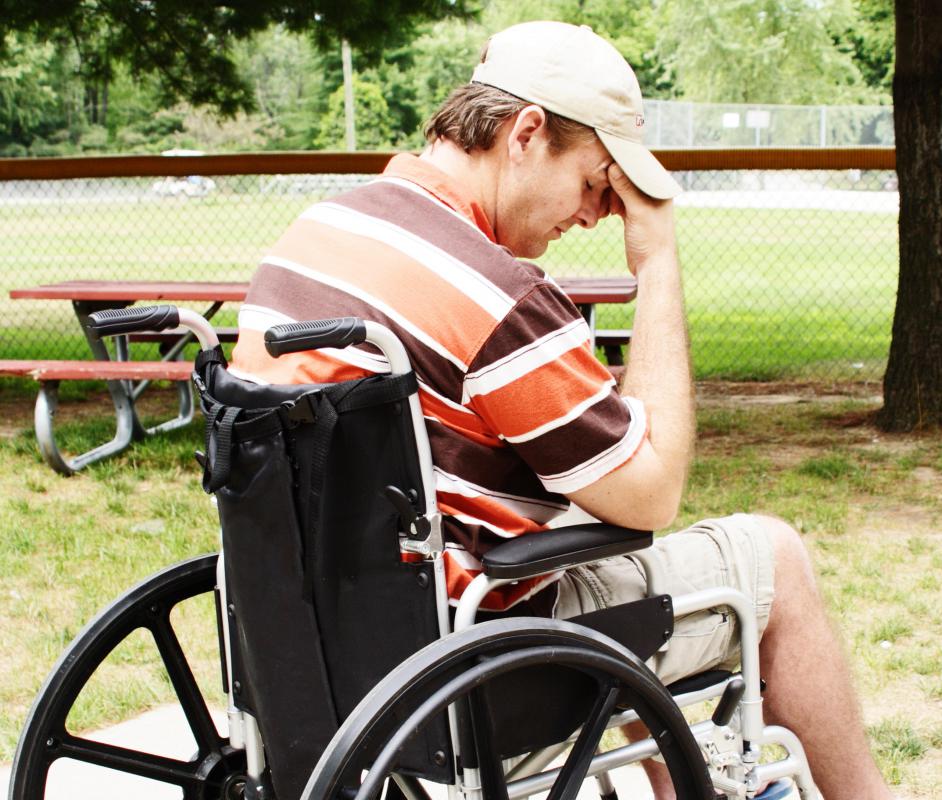At WiseGEEK, we're committed to delivering accurate, trustworthy information. Our expert-authored content is rigorously fact-checked and sourced from credible authorities. Discover how we uphold the highest standards in providing you with reliable knowledge.
What is PTSD?
Post Traumatic Stress Disorder (PTSD) occurs in certain individuals who experience a traumatic event which may involve a threat of harm, danger, or death. PTSD sometimes occurs when a person witnesses an accident, natural disaster or other type of violence. Soldiers, for example, who experience combat sometimes develop PTSD.
Other instances that might trigger Post Traumatic Stress Disorder include living in a combat area, experiencing physical or domestic abuse or rape, or surviving a life-threatening injury, illness, or natural disaster. Any event that causes fright, helplessness or terror can trigger PTSD.

The resulting stress after such an event is an anxiety disorder. Symptoms of PTSD include sleep problems, nightmares, flashbacks, panic attacks, or feelings of guilt, detachment or paranoia. Flashbacks are troubling, realistic memories of the traumatic event. The results of Post Traumatic Stress Disorder can impair a person's ability to function on a daily basis.

Some victims of PTSD may experience extreme anxiety that the traumatic event is recurring. Others may be unable to talk about the traumatic event or feel unable to express feelings or emotions with those unrelated to the tragedy. Another symptom is extreme tension which can cause anger or irritability. Other symptoms include having an unexplainable fear, becoming easily startled or experiencing difficulty with concentration.
Although the actual cause of PTSD is not determined, doctors believe that chemicals released during the tragic event alter the function of the brain in some form.

Because not everyone who experiences a traumatic event develops PTSD, experts have determined that the disorder is more likely to occur in certain types of people. Those who are likely to develop PTSD might have additional mental health conditions, either personally or in their family, or experienced serious disturbances during childhood. Females, alcohol users, those who are under stress, or those do not have a strong support group are more likely to develop PTSD.

Someone who experiences PTSD symptoms for over one month should seek help from a mental health professional or medical doctor. Interviews and questionnaires administered by a professional can help diagnose Post Traumatic Stress Disorder. Counseling and drug therapy are effective forms of treatment. Relaxation therapy is also helpful to some PTSD sufferers.

Organizations that provide additional information on PTSD include the Anxiety Disorders Association of America, International Society for Traumatic Stress Studies, National Alliance for Mental Illness, National Center for Post-Traumatic Stress Disorder, National Institute of Mental Health and PTSD Alliance.
AS FEATURED ON:
AS FEATURED ON:


















Discussion Comments
I just had a recent relapse of a rape I suffered at age 18. I am now 27. My boyfriend and I were recently having a sexual conversation about sex and since I have been paranoid and having flash backs, insomnia and my mind is racing. What can I do to overcome this?
I recently found out that Ambien has contributed to the frequency of my PTSD spells. I feel better now where this is concerned, but I'm still not sleeping.
I am also afraid of sleeping and I have insomnia most nights. When I do sleep, I sleep from 15 minutes to 2 hours at a time. I also have night terrors and spells where I feel like a young child and have fits and crying spells.
I am being treated for it and I have had some success, but nothing really helps for any length of time. Counseling makes it worse, because it brings it all up constantly. I find it better to not think about it if I can.
@Anon85554: Have you considered the possibility of a service dog? A lady and her service dog were at my workplace just the other day and she said her dog was a PTSD service dog. I know many people have had very good luck with PTSD service dogs in living more normal lives. Good luck.
I'm an 18 year old girl and I have been told that I have PTSD. And from this article, I can see how I would fit the bill. Three years ago I was knocked down walking home from school and since then I have developed extreme insomnia and experience flashbacks night and day.
But I feel I have more than insomnia- i have a fear of sleeping. I have frequent night terrors in which i would cry out and such.
I am starting college this September, and I feel completely helpless. Does anyone know what I can do without resorting to medication? I have tried teas, lavender, exercise before bed but I still can't get more than an hour an night. My sleep therapist is completely baffled.
Post your comments